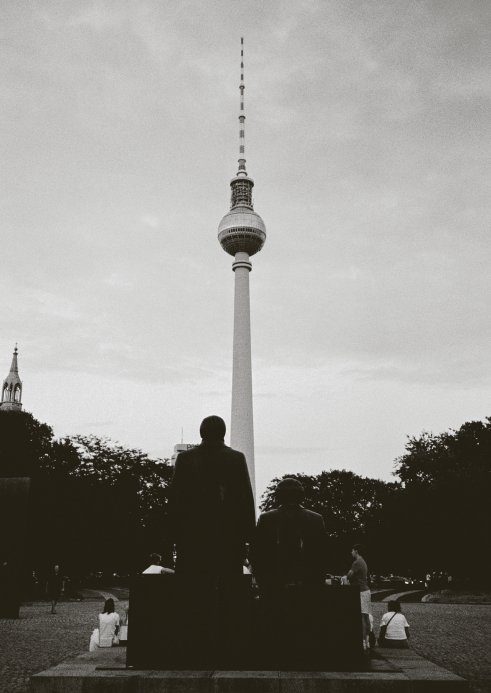“It is not our bodies that are wrong, but a poorly-equipped society.”
The fact that the self-determination of people with disabilities is a public issue today is not a matter of course, but rather the outcome of a movement which started forty years ago in the United States but which is still largely unknown: the disability rights movement. For the first time people with disabilities are making their voices heard – loud, ungrateful, even angry, because of the constant paternalism they have experienced. We talked to the left-wing activist Tim in Berlin about who is disabling whom, what needs to happen, and why the cinema is apparently not for disabled people.
Many know about the women’s rights movement, the political struggle of gay people, but still relatively few have heard of the disability rights movements. Does that surprise you? And do you actually use the term `disabled`?
Yes, I do use it, but only in the sense that society is disabling us. And the fact that the movement is so unknown does not surprise me at all. Disability is not a very trendy theme in general. It first provokes misgivings; many want to stay away from it. Also, the movement has become small, especially over the last years. It annoys me that nobody knows it. Many achievements that are taken for granted today would not exist without it. Elevators in train stations or the chance to choose one’s caregiver – it is not that the government just came up with all that.
…or to rename the German TV lottery which gives money to disability projects `Aktion Sorgenkind` (`Campaign Problem Child`) into `Aktion Mensch` (`Campaign Human Being`).
Yes, but that only happened in 2000. It was the disability rights movement that turned itself particularly against the idea of aid and this whole business of pity: people who do not know me are convinced they know how my life looks like, how I am. However, it is me who knows best.
…and all this being nicely presented in a wellmeaning fashion.
Yes, that really gets on my wick. It’s not long ago that I got petted on the head by complete strangers or that I was given a Euro – as a donation. Stuff like that happens less frequently today. What still gets me though is when people are talking about me over my head. For instance when I am with others, especially non-disabled people, it is always them who are being addressed, not me. They are then being asked: “Where does he want to go?” or “Can he get there with his wheelchair?” As if I just wasn’t there. People are so insecure and afraid to do something wrong, they rather avoid any contact whatsoever. I’d prefer if people would say said something funny at times, or ask a stupid question rather than being constantly excluded as a subject. I also experience this type of exclusion in lefty circles, although to a lesser degree. But often interaction becomes normal more quickly, probably because people are used to the feeling of being outcasts themselves.
What does social exclusion of disabled people look like today? I’m not that familiar with it, I only know that there are special care homes and schools for people with special needs. Have you been in any of that?
No. But my parents had to fight for that. They wanted to me to go to school with all my friends from the neighborhood. However in order to do so I needed to undergo numerous tests. Many medical reports were needed. Nevertheless enrolment only happened on a trial basis. At any time they could have taken me out of the school and put me into a special needs school. It is good that there is a lot of talk about `inclusion` today and that it is not compulsory to attend special needs schools any more. However, many children with special needs are being put there since regular schools are claiming not to have enough money or properly trained staff. Apart from that this new politic also shows a modernisation of capitalism.
What do you mean by that?
Well, what and who is defined as disabled always depends on how people are `vernutzt` (used up for economic profit). Those who possess very little only have their body to work and earn money with. But what if this working force does not ` function` probably? Then there is the question of how to deal with a person labelled as `unproductive`. The common method used to be custody. These days, however, physical work has become less important in most Western states. Thus the entire `disabled` workforce lies waste. It can be useful after all. That’s why part of my specially equipped car is being financed – but only if there is proof of employment. On the contrary, if I would be unemployed I do not need to leave my house according to the state. I am allowed to submit travelling receipts for going to the job centre or job applications, but apart from that I am supposed to just stay at home. Going to the café or meeting friends does not count. They gave me my first car when I entered university, and strictly speaking I was only allowed to use it for driving to the university. After graduation, public authorities took it back. This shows that it is now commonly accepted that disabled people are `vernutzbar` as well. Thus disability is being addressed just to the extent that it is counter-productive to the `Vernutzung` (the profitable usage of human capital). According to that view, an unemployed, disabled person should not necessarily go to the cinema.
But the idea that `they are disabled` is not only the state’s view. Most people have internalised norms about what is supposed to be `beautiful` and `normal` and perceive the world in that way. How could such concepts be dissolved?
I believe that as long as disability remains connected to pain, suffering and disadvantage, this won’t change. Maybe if people with disabilities are perceived as self-confident, joyful and sometimes equally depressed people, and if this becomes part of normality, such things could dissolve slowly. But in order for that to happen, all those disabilities made by society have to be removed.
For further reading:
The Icarus Project
A project dealing with „mental illness“


